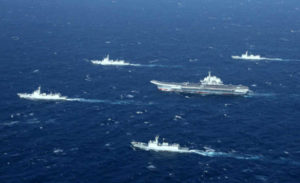This week, China’s much-heralded “third aircraft carrier” took to the sea. Many pundits talked of China’s challenge to American naval power, but that’s just not where China is today. Sam Roggeveen explains in Foreign Policy why China’s navy is built to bully neighbors, not challenge American naval power. At least not yet. Roggeveen is the director of the Lowy Institute’s International Security Program in Sydney. He writes:
China’s launch of a new aircraft carrier, its third and the second built entirely at home, speaks to Beijing’s ambitions to become a military power of global standing and reach. And it suggests that China is prepared to compete with the United States on what has long been Washington’s strongest territory. U.S. military dominance, particularly in Asia, is built on maritime power, which in turn is built around its carrier fleet. Now China is offering a direct challenge: Anything you can do, we can do bigger and better.
Except, not quite.
It’s true that the new Type 003 carrier, now formally named Fujian, is a big improvement on China’s first two carriers. Both of those were smaller, which means they carry fewer aircraft. And they featured what’s known as a “ski jump,” a ramp at the bow of the ship that helps jets take off from the carrier’s short runway.
The ski jump imposes big constraints on the size, weight, and payload of the aircraft being launched, which is why the United States has always preferred steam-driven catapults to hurl aircraft off the ship at high speed. The Type 003 will use catapults, too, and they will be a more advanced electromagnetic design rather than steam-powered. This catches China up to the very latest U.S. technology, so far seen only on the new USS Gerald Ford.
But unlike the Ford and every other serving American carrier, Fujian is not nuclear-powered, which will make it more dependent on support ships to achieve long range and endurance. And then there is the issue of scale. This is China’s first supercarrier, now launched but certainly not finished and still several years from entering service. The United States has 11 supercarriers, each one more powerful than China’s first effort.
Quite apart from the continued massive difference in fleet size and capability, we should also think twice about framing China’s carrier fleet as a direct challenge to the United States. A confrontation between surface fleets centered around carriers in the style of the Battle of Midway is a remote prospect. Submarines and anti-ship missiles are now so potent and omnipresent that aircraft carriers probably wouldn’t survive long in a major war.
But that may not be the point. For the United States, aircraft carriers have been useful in the post-Cold War era against countries that were largely defenseless when it comes to naval warfare—Iraq, Libya, and Yugoslavia, for instance. In fact, the U.S. Navy has tacitly acknowledged this point by gradually decreasing the range of the combat aircraft it fields aboard its carriers. Why bother with long range if you can safely sail the carrier itself close to enemy shores?
China may be designing its carrier fleet for the same purpose. It wants a force that can help the Communist Party coerce or punish smaller powers, not fight a peer competitor. Right now, of course, China would find it hard to deploy this kind of power without stumbling into America’s security network in Asia. But already that network is fraying at the edges, as China has demonstrated by effectively taking control of the South China Sea, building artificial islands there and equipping them with military facilities. It happened without much resistance from the United States, which quite understandably calculated that its interests were not so threatened by China’s moves that it would be willing to risk a major war. That same nagging question—is America’s military leadership and alliance network in Asia really important enough to risk a confrontation with the biggest rival the United States has ever faced?—is slowly eroding the credibility of the U.S.-centered security architecture of the region.
So, the Type 003 may not be a direct challenge to American naval power. Rather, it is a sign that China is thinking about an era when the credibility of U.S. power in Asia has further eroded and when China itself has a freer hand to deal with smaller countries. In other words, China is building a post-American fleet.
If you’re willing to fight for Main Street America, click here to sign up for the Richardcyoung.com free weekly email.





